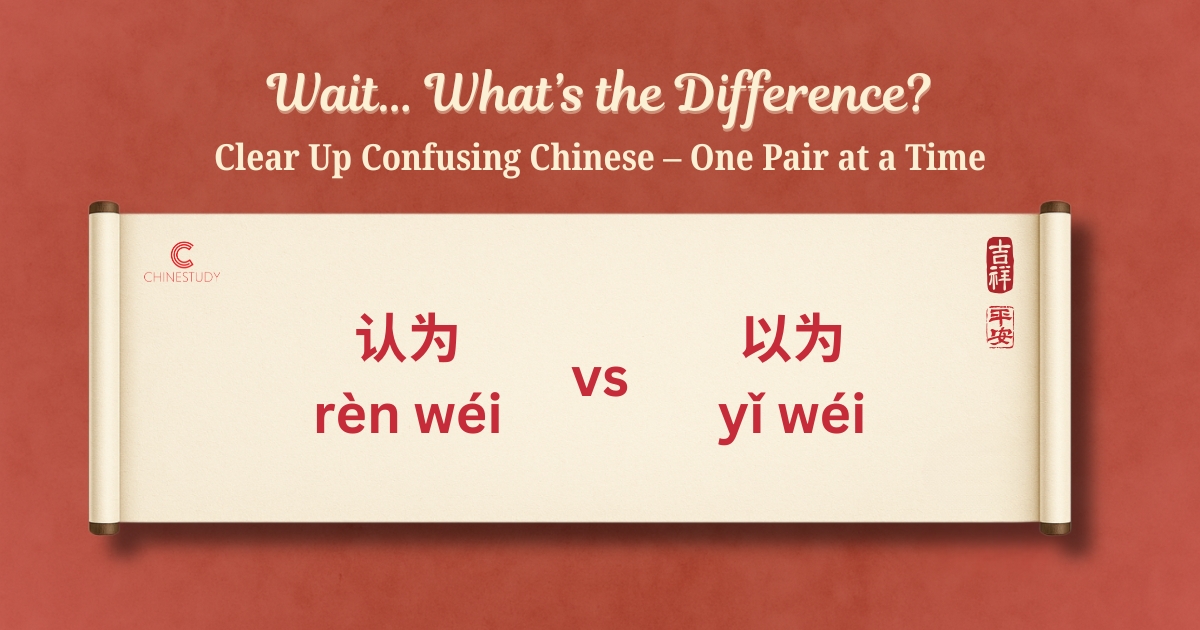🤔 认为 rènwéi vs 以为 yǐwéi – What’s the Difference?

Both 认为 and 以为 mean “to think” in Chinese — but not in the same way!
Let’s break it down so you don’t get tricked by this common mix-up. 😄 🧠
🔍 Breakdown
🟠 认为 (rènwéi) – to believe / to be of the opinion that
- Based on reasoning, judgment, or facts
- Often used in more formal or neutral statements
- You still believe it’s true now
🟢 以为 (yǐwéi) – to mistakenly think / to assume
- Usually means you were wrong
- The belief has changed or turned out to be incorrect
- Often followed by a surprise or correction
📌 Key difference:
- 认为 = you think and still believe it.
- 以为 = you thought it, but it turned out to be wrong.
💬 Easy Examples
✅ 认为 (rènwéi) – to believe / to be of the opinion that
🟠 认为 Example 1:
- 我认为这个办法更好。
- Wǒ rènwéi zhège bànfǎ gèng hǎo.
- 👉 I think this method is better.
- 📝 A logical opinion.
🟠 认为 Example 2:
- 很多人认为中文很难。
- Hěn duō rén rènwéi Zhōngwén hěn nán.
- 👉 Many people think Chinese is difficult.
- 📝 General belief or view.
🟠 认为 Example 3:
- 老师认为我进步很大。
- Lǎoshī rènwéi wǒ jìnbù hěn dà.
- 👉 The teacher thinks I’ve made great progress.
- 📝 Present opinion based on observation.
✅ 以为 (yǐwéi) – to mistakenly think / to assume
🟢 以为 Example 1:
- 我以为你不来了!
- Wǒ yǐwéi nǐ bù lái le!
- 👉 I thought you weren’t coming!
- 📝 But you did come — I was wrong.
🟢 以为 Example 2:
- 他以为今天是星期五。
- Tā yǐwéi jīntiān shì Xīngqīwǔ.
- 👉 He thought today was Friday.
- 📝 It’s not — that was a mistake.
🟢 以为 Example 3:
- 我以为这个词的意思是“喜欢”。
- Wǒ yǐwéi zhège cí de yìsi shì “xǐhuan”.
- 👉 I thought this word meant “like.”
- 📝 But it doesn’t — again, a wrong guess.
📝 Sometimes both 认为 and 以为 are grammatically correct — but the meaning can be very different. Choose carefully based on context!
🎯 Interactive Practice
Choose the correct word: 认为 (rènwéi) or 以为 (yǐwéi)
1. 他 ______ 你已经走了,其实你还在。
(Tā ______ nǐ yǐjīng zǒu le, qíshí nǐ hái zài.)
- 👉 He thought you had left, but you were still here.
- ✅ Correct answer: 以为 (yǐwéi)
- 🎯 He was wrong — it’s a mistaken assumption.
2. 我 ______ 这个问题很重要。
(Wǒ ______ zhège wèntí hěn zhòngyào.)
- 👉 I think this problem is important.
- ✅ Correct answer: 认为 (rènwéi)
- 🎯 This is your opinion now — not a mistake.
3. 小明 ______ 明天不用上课,结果要上。
(Xiǎo Míng ______ míngtiān bú yòng shàngkè, jiéguǒ yào shàng.)
- 👉 Xiao Ming thought there was no class tomorrow, but there is.
- ✅ Correct answer: 以为 (yǐwéi)
- 🎯 Assumption turned out to be wrong.
4. 我 ______ 你说得有道理。
(Wǒ ______ nǐ shuō de yǒu dàolǐ.)
- 👉 I think what you said makes sense.
- ✅ Correct answer: 认为 (rènwéi)
- 🎯 Logical belief — no mistake here.
🚀 Final Tip
- 📌 认为 (rènwéi) = “I believe,” “I think” → used for opinions or judgments
- 📌 以为 (yǐwéi) = “I thought (but I was wrong)” → used for mistaken assumptions
✍️ Try making two sentences:
– one with 认为 for a belief you currently hold
– one with 以为 for something you mistakenly thought
Practice makes progress! 加油!💪
👉 Think this was tricky? More word pairs are waiting to mess with your brain — check them out here! 😄📘
Thank you for subscribing!
Have a great day!